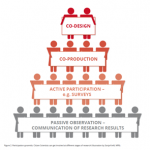In short, everyone is a Citizen Scientist who is working outside of the academia but is willing to voluntarily contribute to the advancement of science with their curiosity, time, effort, knowledge or even computing power (Yadav et al. 2017). Online gamers with or without programming skills, students and their parents seeking to gain hands-on experience outside of the classroom, retirees aiming to spend their leisure time in useful ways, policy-makers looking to help making informed decisions, or even prisoners can push new frontiers in our understanding of our world.
The availability and use of devices like smartphones with GPS, camera and microphone broaden participation in citizen science in ways previously not possible, as they allow different communities to collect data in an accurate, standardised and easily captured and contextualised manner, using such device-based capabilities as noise level or location and time stamps. Also, mobile apps and social media enable real-time dialogue between scientists and citizens (Newman et al. 2012).
Participants can be involved in Citizen Science project on many different levels. They can contribute to data collection or annotation but can also be engaged in some or all other steps the research process from the design of research questions through the analysis and interpretation of the gathered sources, even to the publication of research results either in peer-reviewed scientific topical journals or in publication fora dedicated to Citizen Science such as the Open Access peer-reviewed journal of the Citizen Science Association, the Citizen Science: Theory and Practice. In many cases, they can use these scientific insights to influence policy decisions. To align research agendas and objectives with real community priorities, citizens can also decide about the questions and topics to investigate either in collaboration with professional scientists or alone. In fact, the most effective Citizen Science programs are built on this alignment and allow the different communities to investigate issues they are really passionate about (see e.g. literary wikis collectively developed by fans of particular authors or works) or directly impact their everyday lives (see e.g. investigations in local history (see the case study below) or urban ecology projects (e.g. Project Pigeonwatch, Celebrate Urban Birds, Project BudBurst


Contrary to what the term ‘science’ might suggest for native English speakers, Citizen Science projects do not pertain only to STEM disciplines, however. The study of human cultures and societies – subject areas of Cultural Heritage and Humanities – also attract many participants to engage via oral history, transcription of manuscripts, tagging old texts, photos, or works of art, building dictionaries collectively, recognizing archaeological sites, uncovering shocking episodes of local history or crowdsourcing digital collections of letters. You can learn more about such projects below. That said, much of the guidance material available either focusses on hard science applications and/or gives mostly generic guidance. In this module, we will draw out lessons for the researcher looking to develop a citizen science project specifically in the arts and humanities, as well as indicating what supports might be available for such endeavours through research infrastructures such as CLARIN, DARIAH, and E-RIHS.
- Susan Schreibman: From Archives to Activism: Why Public Engagement is Essential for the Future of the Humanities, 2017. Podcast) https://rs.cms.hu-berlin.de/rv-dh2017/pages/view.php?ref=37&k=0e3762dc43 Slides: http://www.ifdhberlin.de/fileadmin/user_upload/Schreibman_DH-Ringvorlesung-WS-17-18_Archives-to-Activism_2018-02-13.pdf
- Anne Bowser and Lea Shanley, New Visions in Citizen
Science, 2013, chapter Citizen Archivists. https://www.wilsoncenter.org/publication/new-visions-citizen-scienc - Betsy Rymes, and Andrea L. Leone: Citizen Sociolinguistics: A New Media Methodology for Understanding Language and Social Life, 2014 https://goo.gl/QHX4xC
- Susanne Hecker et al.: Urban Archaeology (Stadtarchäologie Wien), Science and Volunteers – A Challenge, 2018 In: Proceedings of the Austrian Citizen Science Conference 2017 https://www.researchgate.net/publication/322721621_Storytelling_in_Citizen_Science_-_Potential_for_Science_Communication_and_Practical_Guideline
- Alexander Noack et al.: Transcriba – A Citizen Science Project Supporting the Transcription of Manuscripts through Gamification, 2018 In: n: Proceedings of the Austrian Citizen Science Conference 2017 https://www.researchgate.net/publication/322721621_Storytelling_in_Citizen_Science_-_Potential_for_Science_Communication_and_Practical_Guideline)
- Günter Mühlberger et al. Handwritten Text Recognition (HTR) of Historical Documents as a Shared Task for Archivists, Computer Scientists and Humanities Scholars. The Model of a Transcription & Recognition Platform (TRP) (preprint), https://www.academia.edu/8601748/Preprint_Handwritten_Text_Recognition_HTR_of_Historical_Documents_as_a_Shared_Task_for_Archivists_Computer_Scientists_and_Humanities_Scholars._The_Model_of_a_Transcription_and_Recognition_Platform_TRP_

